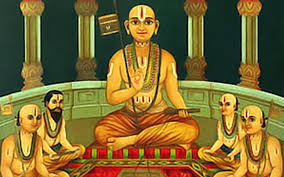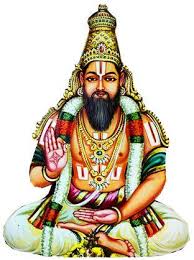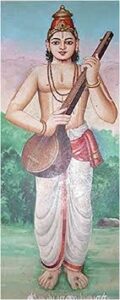Kuresh’s Ultimate Sacrifice for His Guru
Kuresh, a devoted disciple of Sripad Ramanujacharya, exemplified the depth of devotion and sacrifice for his guru. When the tyrannical king of the Chola dynasty sent soldiers to arrest Ramanujacharya and force him to renounce his theology or face death, Kuresh displayed incredible bravery and selflessness. He proposed to his guru, “You change clothes with me. I am a householder; you take my clothes, and I will put on the saffron robes.” Knowing that the king’s men did not recognize Ramanujacharya by sight, Kuresh volunteered to go in his place, willing to face whatever fate awaited him.
Ramanujacharya was initially resistant, not wanting to subject his beloved disciple to such a dangerous situation. However, Kuresh’s sincere desire was not born of fear or austerity but of an unshakeable devotion to his guru. Recognizing this, Ramanujacharya allowed Kuresh to fulfill his wish, knowing that Kuresh’s act of self-sacrifice would become a timeless example of pure devotion.
Kuresh’s Blindness and His Unwavering Devotion
Kuresh, disguised as Ramanujacharya, went to the court of the Chola king, where he defeated all the scholars in debate. Enraged by this, the king ordered that both Kuresh and another devotee, Maha Purna, have their eyes burned out with red-hot iron rods. After enduring the brutal punishment, Kuresh, now blind, thanked the executioners with folded hands. He expressed his eternal gratitude to them, saying, “You have allowed me to render such intimate service to my Gurudev. I thank you.” His sincerity was so profound that it melted the hearts of the executioners.
Despite the unimaginable suffering, Kuresh was joyful, feeling honored to have given up his eyes in the service of his guru. When Ramanujacharya heard of this, Kuresh sent him a message, urging him not to feel sorrow. “I am not in pain; I am happy because you allowed me to serve you in such an intimate way,” he assured his guru.
Kuresh’s Noble Requests
Later, Ramanujacharya, deeply pained by Kuresh’s condition, requested him to pray to Lord Vishnu for the restoration of his eyesight. Kuresh, however, had a different prayer in mind. When the Lord appeared before him and offered to fulfill any of his desires, Kuresh asked for the forgiveness of the Chola king, who had ordered his blinding, and for the king to be elevated to Vaikuntha, the spiritual world. The Lord granted this request, sending the soul of the already deceased king to Vaikuntha.
Ramanujacharya then urged Kuresh to pray for the restoration of his sight, as that was the guru’s wish. Kuresh, however, had no desire to see the material world again. He only wished to see the Lord and his guru within his heart. This humility and selflessness marked Kuresh as one of the most exalted devotees of the time.
Ramanujacharya’s Humility and Kuresh’s Vision
When Ramanujacharya heard of Kuresh’s extraordinary devotion, he wanted to confirm the depth of Kuresh’s spiritual vision. He asked Kuresh to describe what Lord Vishnu was wearing in the temple. Despite being physically blind, Kuresh accurately described every detail of the Lord’s attire, the flowers, the color of the cloth, and even the backdrop. Ramanujacharya then asked Kuresh to describe him, and Kuresh was able to do so with precise accuracy, proving that although he was blind to the material world, he was always seeing the Lord and his guru in his heart.
Before leaving his body, Kuresh prayed to the Lord to allow him to return to the spiritual world and to grant that anyone close to him would also attain the spiritual realm. The Lord granted this blessing, and when Ramanujacharya heard that Kuresh was about to leave this world, he began to dance in ecstasy. When asked why he was so joyful, Ramanujacharya replied, “He has received a benediction that anyone who is close to him will attain the spiritual world, and I am his guru, so I will also get to go.”
Lessons to Be Learned from Kuresh’s Life
- The Power of Selfless Service:
- Kuresh’s willingness to sacrifice his life and eyesight for his guru shows the power of selfless service. His actions teach us that true devotion involves putting the needs of others, especially our spiritual guides, above our own.
- Forgiveness and Compassion:
- Even after enduring unimaginable cruelty, Kuresh’s first prayers were for the forgiveness and spiritual elevation of those who had wronged him. This highlights the importance of forgiveness and compassion, even towards those who cause us harm.
- The Value of Spiritual Vision:
- Kuresh’s preference for spiritual vision over physical sight teaches us that the true goal of life is to see the Lord and our spiritual guides within our hearts. Material vision is temporary, but spiritual vision connects us to eternity.
- Humility in Leadership:
- Ramanujacharya’s humility, as seen in his joy at Kuresh’s impending departure, exemplifies true leadership. Despite being a great acharya, he considered himself a servant of his disciples, rejoicing in their spiritual success.
Prayer for Devotion and Humility
O Supreme Lord Vishnu, and beloved Guru Ramanujacharya, We bow before You, seeking the blessings of Your pure devotee, Kuresh.
May we learn to serve selflessly, as Kuresh did, Offering our lives in devotion and sacrifice for the pleasure of our spiritual guides.
O Lord, grant us the strength to forgive those who wrong us, And the vision to see You within our hearts, beyond the illusions of this material world.
May we, like Kuresh, aspire to spiritual vision, And may our devotion be pure, humble, and unwavering.
Hare Krishna, Hare Krishna, Krishna Krishna, Hare Hare, Hare Rama, Hare Rama, Rama Rama, Hare Hare.
Om Tat Sat.



